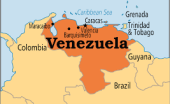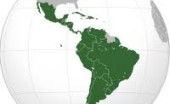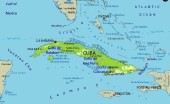Johannah Bernstein post: "eternally proud of my father’s extraordinary aeronautical engineering. legacy. here is a photo of the Canadair Water…
President Obama & the Americas
Written by Diana Thebaud Nicholson // June 29, 2009 // Americas, Canada, Foreign Policy, Geopolitics, Government & Governance, U.S. // Comments Off on President Obama & the Americas
Search ‘Latin America’ on www.wednesday-night.com
The Eclipse of the Americas
How the Trinidad Summit Marked the Fragmentation of the Inter-American System
Richard Feinberg
(Foreign Affairs) With the spirit of an all-inclusive hemispherism in eclipse, the United States will have to shop around or create forums where it can pursue its interests with willing partners — what in the Western Hemisphere becomes a hub-and-spoke system. The country composition of the spokes will vary depending on the issue at hand — on energy, the spokes will likely include Canada, Brazil, Chile, Mexico, and maybe Bolivia and Ecuador; for immigration, the Caribbean, Central America, Mexico, and possibly some Andean nations; for economic relief for the poor, countries that share some similar approaches include Brazil, Mexico, and perhaps Nicaragua, among others; on counternarcotics, Guatemala, Mexico, and Andean nations. Extra-hemispheric powers such as China, Europe, and Japan might be included in some working coalitions when appropriate. [Background reading: Threat and Opportunity in the Americas, by Abraham F. Lowenthal, the founding director of the Latin American Program at the Woodrow Wilson International Center for Scholars in Washington, D.C. (1985)]
Honduran coup summons memories of U.S. plots in Latin America
The recent military coup in Honduras, condemned by U.S. President Barack Obama as an illegal ouster of a legitimate sitting leader, summoned memories of previous U.S. interference in Latin American political affairs — in particular as Venezuelan President Hugo Chavez described the coup as a U.S. plot. The Obama administration said in recent days it worked to head off a crisis between Honduran President Manuel Zelaya and the military over his efforts to lift limits on presidential terms there. The New York Times (6/29)
20 May
A Counterintelligence Approach to Controlling Cartel Corruption
(Stratfor) … when one examines the reach and scope of the Mexican cartels’ efforts to recruit agents inside the United States to provide intelligence and act on the cartels’ behalf, it becomes apparent that the cartels have demonstrated the ability to operate more like a foreign intelligence service than a traditional criminal organization.
14 May
Argentina: The Kirchners’ electoral gambit
FOR Argentina’s president, Cristina Fernández, and her husband and predecessor, Néstor Kirchner, this year’s election for half the lower house of Congress and one-third of the Senate is no routine mid-term vote. With the economy deteriorating fast, Ms Fernández brought the poll forward from October to June 28th. Mr Kirchner, who is the president of the ruling Peronist party, is himself standing for the lower house in the all-important province of Buenos Aires, which contains two-fifths of the voters. Ex-president jolts Argentina with legislative run: With the popularity of his wife — the current president — sagging, former Argentine President Nestor Kirchner is getting back into politics by running for a senate seat.
12 May
PM SAYS AMERICAS TRADE PACT DEAD
(RCI) Prime Minister Stephen Harper says that the project of creating a Free Trade Zone of the Americas is dead. The prime minister told La Presse newspaper that the project of joining 34 nations in North and South America and the Caribbean in a single free-trade area wasn’t realistic and didn’t even arise at the recent Summit of the Americas in Trinidad and Tobago. Mr. Harper says the idea, which received lengthy debate and negotiation during the 1990s, is defunct and that now Canada is seeking trade pacts with individuals states or groupings of them in the Americas. The prime minister also says Canada is banking on reaching within two years a free-trade accord with the EU, which he says will make his country the port of entry for Europeans wishing to invest in North America. Mr. Harper says that by 2013 Canada will have the lowest rate of debt in terms of percentage of gross domestic product, affirming as well that the beginning of Canada-EU trade talks will be warning to the Americans against protectionist trade measures toward Canada.
9 May
Chavez seizes oil service firms
(BBC) Venezuelan President Hugo Chavez has sent troops to take over companies that provide services for the oil industry.
The service companies are owed billions of dollars by PDVSA. But the state firm says lower oil prices mean the contractors are being paid too much. President Chavez has re-invigorated his nationalisation programme since his victory in a February referendum that removed limits on how many times he and others can stand for re-election. (Good background links from this page)
Hillary and Latin America
By MARK WEISBROT, economist and co-director of the Center for Economic and Policy Research
“[W]hen we look around the world, actually, we see a number of countries and leaders — Chavez is one of them but not the only one — who, over the last eight years, has become more and more negative and oppositional to the United States. . . the prior administration tried to isolate them, tried to support opposition to them, tried to . . . turn them into international pariahs. It didn’t work.”
The sad reality is that while the United States has at least some civil society organizations that can present an independent view to the public on domestic issues, on foreign policy issues we are much more like Russia. The vast majority of expert opinion on foreign policy that is allowed access to major media in the United States consists of government officials, former government officials, or people who or are otherwise influenced by the government. This is one reason why it was so easy to invade Iraq, and so difficult to get out of there or out of Afghanistan – in spite of the American public’s long-standing lack of enthusiasm for sending combat troops overseas.
7 May
Panama’s presidential election
(The Economist) AFTER a string of Latin American election victories for the left, Panama has bucked the trend. Ricardo Martinelli, a wealthy businessman running as a centrist independent, trounced the candidate of the governing centre-left Democratic Revolutionary Party (PRD)
Panama is suffering a sudden economic slowdown after a wild boom. With foreign investment pouring in to property development and new ports, the economy has grown at around 8% a year for five years. Now Panamanians are suffering from a property bust and rising food prices. Even so, Martín Torrijos, the outgoing president, remains popular. But his party’s candidate, Balbina Herrera, was unable to live down her reputation as a henchwoman of General Manuel Noriega, the thuggish strongman who controlled Panama before being ousted by an American invasion in 1989.
24 April
Obama seems to favor undemocratic Latin American leaders.
(Forbes) At the Summit of the Americas in Trinidad and Tobago this past weekend, the president might have encouraged the leaders who are still attempting to give their countries enduring democratic institutions. Instead, Obama behaved as if he himself were an unreconstructed Latin American. He reserved cordiality for the strongmen.
22 April
Obama and Latin America
(The Nation) There is no other region, save perhaps Europe, that offers Obama a better chance to practice the kind of cooperative diplomacy he has defined as the goal of his administration. Except for civil war in Colombia and drug violence in Mexico, Latin America is at peace; nuclear weapons are not a concern; most countries are led by democratically elected presidents committed to a progressive hemispheric agenda that would downplay terrorism and put top priority on alleviating poverty, inequality, crime and environmental problems. Yet having diversified their ties with China, Europe and the Middle East over the past decade, Latin American governments now expect to deal with the United States as equals. They are willing to help Washington manage its decline and ease its transition into a multipolar world, but they are no longer likely to submit to its dictates.
20 April
Assessing Obama’s Repair Job in Latin America
(U.S. News) Starting with an easing of the Cuban embargo, the president tried to win over skeptical leaders
You could call it Latin America week for President Obama—a week of modifying a hard-line approach on Cuba, embracing a Mexican government beset by drug violence, and launching a U.S. effort to reach out to nations of the Western Hemisphere that contend they haven’t gotten much attention or respect while Washington has grown preoccupied with the Middle East and terrorism.
19 April
Declaration of Commitment of Port of Spain
Securing Our Citizens’ Future by Promoting Human Prosperity, Energy Security and Environmental Sustainability
16 April
Summit of the Americas: The anti-corruption path to prosperity
(Transparency International) In tackling regional economic development issues and facing the current global economic crisis, leaders will be confronted by the need to address corruption as a fundamental stumbling block on the path to prosperity.



